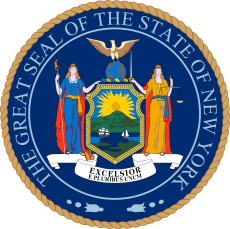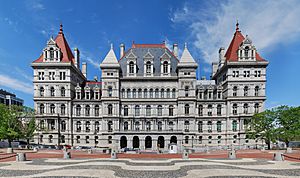New York State Legislature facts for kids
Quick facts for kids New York State Legislature |
|
|---|---|

|
|
| Type | |
| Type | |
| Houses | Senate Assembly |
| History | |
| Preceded by | General Assembly of New York |
| Leadership | |
|
Antonio Delgado (D)
Since May 25, 2022 |
|
|
Senate Majority Leader
|
Andrea Stewart-Cousins (D)
Since January 2, 2019 |
|
Speaker of the New York State Assembly
|
Carl Heastie (D)
Since February 3, 2015 |
| Structure | |
| Seats | 213 |
 |
|
|
Political groups
|
Majority caucus
Minority caucus
|
 |
|
|
Political groups
|
Majority caucus
Minority caucus
|
| Salary | $142,000/year + per diem |
| Elections | |
|
Last election
|
November 8, 2022 |
|
Next election
|
2024 |
| Meeting place | |
 |
|
| New York State Capitol, Albany | |
| Website | |
The New York State Legislature is the law-making body for the state of New York. It is made up of two main groups, called "houses." These are the New York State Senate and the New York State Assembly. Having two houses means it is a "bicameral" legislature.
The New York State Constitution says that the power to make laws for the state belongs to these two houses. Laws passed by the Legislature are officially published as the Laws of New York. Important laws that apply to everyone are collected in the Consolidated Laws of New York. As of January 2021, the Democratic Party has a very strong majority in both houses. This means they have more than two-thirds of the seats. The New York State Legislature is also the highest paid state legislature in the United States.
Contents
How the Legislature Works
Legislative elections happen in November every two years. Both members of the Assembly and Senators serve for two-year terms.
Who Can Be a Member?
To be a member of either house, you must be a citizen of the United States. You also need to have lived in New York State for at least five years. Plus, you must have lived in the specific district you want to represent for at least one year before the election.
Number of Members
The Assembly has 150 members. Each member is chosen from a single area, called a "district." The New York Constitution allows the number of Senate seats to change. As of 2014, the Senate had 63 members.
Legislative Leaders
Each house of the Legislature has its own leaders. These leaders help guide the work of their house.
Assembly Leadership
The Assembly is led by a person called the Speaker. The Speaker is a very important leader in the Assembly.
Senate Leadership
The Senate is led by the President of the Senate. This job is held by the State Lieutenant Governor. The Lieutenant Governor usually only votes if there is a tie. Most of the time, another Senator leads the meetings. This person is called the temporary president.
Powerful Leaders
The Assembly Speaker and the Senate Majority Leader are very powerful. They decide which committees members join. They also control what topics are discussed and voted on in their houses. Along with the governor of New York, these two leaders guide most of the state's important decisions.
Making Laws and Research
The Legislature has a special group called the Legislative Bill Drafting Commission (LBDC). This group helps write new laws. They also check if proposed laws follow the Constitution. They do research and keep track of all the Legislature's important documents. Two commissioners lead the LBDC. They are chosen by the Senate's temporary president and the Assembly's Speaker.
Party Control in the Legislature
Political parties play a big role in the Legislature. In the 2018 elections, the Democratic Party won more control. They gained more seats in the State Senate and kept their strong majority in the State Assembly. At the start of the 2019–2020 session, the Senate had 39 Democratic members out of 63. The Assembly had 106 Democratic members out of 150.
Legislature's Powers
The Legislature has important powers given to it by the state's constitution.
Making and Vetoing Laws
The main job of the Legislature is to make laws. Once a bill (a proposed law) passes both houses, it goes to the Governor. The Governor can approve the bill, or they can "veto" it. A veto means the Governor rejects the bill.
Overriding a Veto
If the Governor vetoes a bill, the Legislature can still make it a law. To do this, both the Senate and the Assembly must vote again. If two-thirds of the members in each house vote to approve the bill, it becomes law even without the Governor's approval. This is called "overriding a veto."
Changing the Constitution
The Legislature can also suggest changes to the New York Constitution. To do this, a majority of members in both houses must vote for the change. After the next election, they must vote for it again. If it passes both votes, the proposed change then goes to the people of New York. They vote on it in a special election called a "referendum." If the voters approve it, the change becomes part of the Constitution.
History of the Legislature
The New York State Legislature has a long history. It began during the American Revolution. Rebels created the New York Provincial Congress because the old General Assembly would not send representatives to the Continental Congress.
Over the years, the Legislature has faced some challenges. For example, in the 1840s, New York led the way in changing how civil lawsuits work. They created the "Field Code," which made legal procedures simpler. Many other states copied this new system.
Important Milestones
- In 1917, Edward A. Johnson became the first African-American person elected to the Legislature. He was a Republican.
- In 1919, the first women were elected. They were Republican Ida Sammis and Democrat Mary Lilly.
- In 1955, Bessie A. Buchanan became the first African-American woman elected to the Legislature.
Current Legislative Leaders
Here are the main leaders in the New York State Legislature right now:
New York State Senate Leaders
- President of the Senate: Antonio Delgado
- Majority Leader: Andrea Stewart-Cousins
- Minority Leader: Rob Ortt
New York State Assembly Leaders
- Speaker of the Assembly: Carl Heastie
- Majority Leader of the Assembly: Crystal Peoples-Stokes
- Minority Leader of the Assembly: William A. Barclay
See also
 In Spanish: Legislatura Estatal de Nueva York para niños
In Spanish: Legislatura Estatal de Nueva York para niños
- George G. Barnard
- Gibbons v. Ogden
- The Frawley committee
- The Hepburn Committee
- List of New York Legislature members expelled or censured
- New York Provincial Congress
- New York State Assembly
- New York state public-benefit corporations
- New York State Senate
 | DeHart Hubbard |
 | Wilma Rudolph |
 | Jesse Owens |
 | Jackie Joyner-Kersee |
 | Major Taylor |

